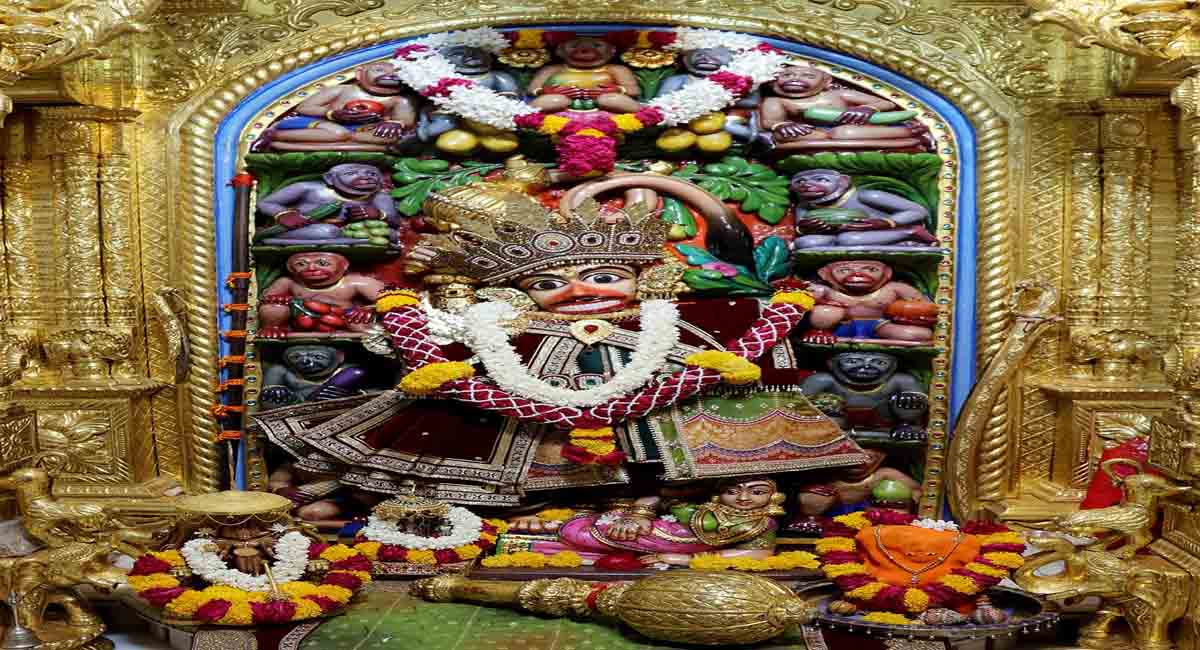Hanuman Jayanti 2024 is a significant Hindu festival that is celebrated every year to commemorate the birth of Lord Hanuman. This festival is observed on the full moon day of the Hindu month of Chaitra Navratri. In 2024, Hanuman Jayanti will be celebrated on April 23rd (Tuesday).
Hanuman Jayanti Puja Time
| Hanuman Jayanti on | Tuesday, April 23, 2024 |
| Purnima Tithi Begins | 03:25 AM on Apr 23, 2024 |
| Purnima Tithi Ends | 05:18 AM on Apr 24, 2024 |
2024 Hanuman Jayanti
Hanuman Jayanti is celebrated on the full moon day during the Chaitra month to commemorate the birth of Hanuman, who is also known as the Vanara God.
Different regions celebrate Hanuman Jayanti at different times of the year based on their beliefs and calendars. In North Indian states, the most popular time is during Chaitra Purnima.
In Andhra Pradesh and Telangana, devotees observe a 41-day Deeksha starting on Chaitra Purnima and concluding on Hanuman Jayanthi day. In Tamil Nadu, it’s known as Hanumath Jayanthi and observed during Margashirsha Amavasya, which falls in January or December on the Gregorian calendar.
Karnataka celebrates Hanuman Jayanti on Shukla Paksha Trayodashi during Margashirsha month, also known as Hanuman Vratam. It’s believed that Hanuman was born at sunrise, so on the day of Hanuman Jayanti, temples start spiritual discourses at dawn before sunrise and stop after sunrise.
Hanuman was an ardent devotee of Lord Rama and Sita and is also known as Anjaneya. Get ready to celebrate the birth of this powerful deity!
The Legend of Lord Hanuman
The legend of Lord Hanuman is a prominent story in Hindu mythology. According to the story, Hanuman was born to Anjana, a female apsara, and Kesari, a vanara king. He had divine powers and was known for his strength, courage, and devotion to Lord Rama.
As a child, Hanuman was mischievous and would often disrupt the sages during their meditation. One day, a sage cursed him to forget his powers until someone reminded him of them. Hanuman grew up unaware of his strength and abilities until he met Lord Rama and his brother Lakshmana during their exile in the forest.
Hanuman became an ardent devotee of Lord Rama and played a vital role in the epic Ramayana. He helped Lord Rama rescue his wife Sita from the demon king Ravana by using his powers to cross the ocean and reach Lanka. Hanuman also fought valiantly in the battle between Lord Rama and Ravana and played a crucial role in the victory of good over evil.
Throughout his life, Hanuman remained devoted to Lord Rama and served him with unwavering loyalty. He is regarded as a symbol of strength, devotion, and selfless service and is worshipped by millions of people worldwide.
Significance of Hanuman Jayanti
Hanuman Jayanti is celebrated to commemorate the birth of Lord Hanuman, the revered deity in Hindu mythology who is known for his strength, devotion, and selfless service. This day is celebrated on the full moon day of the Hindu lunar month of Chaitra, which falls in March or April.
Hanuman Jayanti is an important festival for Hindus and is celebrated with great enthusiasm and devotion across India and other parts of the world. It is believed that worshipping Lord Hanuman on this day brings good fortune, strength, and blessings.
The festival is celebrated by performing puja (worship) of Lord Hanuman and offering special prayers and bhajans (devotional songs). People also fast on this day and visit Hanuman temples to seek his blessings. Many devotees organize processions carrying the idol of Hanuman, chanting hymns and singing devotional songs.
Hanuman Jayanti is also an occasion to reflect on the qualities of Lord Hanuman and his teachings. Hanuman is regarded as a symbol of strength, devotion, and selfless service. His life and teachings inspire people to lead a life of courage, faith, and humility.
The festival also promotes the idea of social harmony and brings people of different castes and communities together to celebrate. It is a time to share happiness and spread love and compassion towards all living beings.
In summary, Hanuman Jayanti is a significant festival that celebrates the birth of Lord Hanuman and his teachings. It is an occasion to seek his blessings and reflect on his qualities of strength, devotion, and selfless service.
Hanuman Jayanti Celebrations
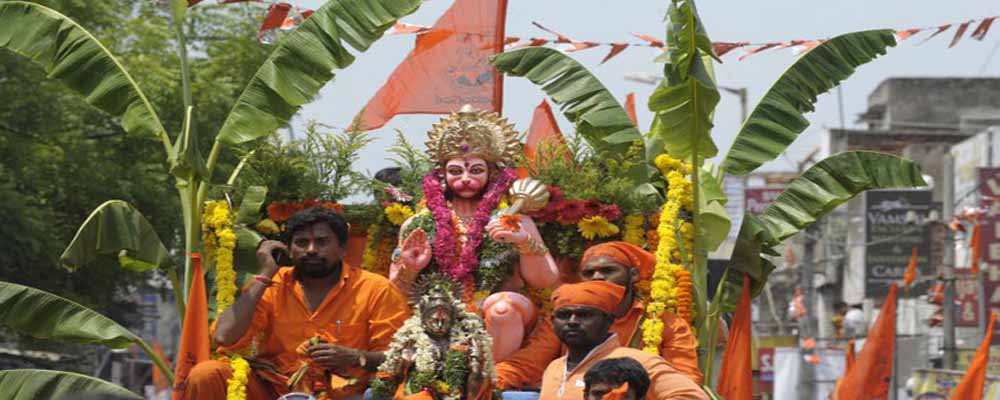
Hanuman Jayanti is an important festival for Hindus and is celebrated with great devotion and enthusiasm across India and other parts of the world. The celebrations of Hanuman Jayanti typically include the following rituals and customs:
- Puja: People perform puja (worship) of Lord Hanuman by offering flowers, sweets, fruits, and incense sticks. They also chant mantras and sing devotional songs in praise of Hanuman.
- Fasting: Many devotees observe a fast on this day as a form of penance and seek the blessings of Lord Hanuman.
- Visiting Temples: Devotees visit Hanuman temples to seek the blessings of the deity. Hanuman temples are decorated with flowers and lights and a special aarti (prayer) is performed.
- Processions: In some places, people organize processions carrying the idol of Hanuman on a chariot, singing devotional songs and chanting hymns.
- Bhajans and Kirtans: Many devotees organize bhajan and kirtan sessions, where devotional songs are sung in praise of Lord Hanuman.
- Offering Food: Many people offer food to the poor and needy on this day as a form of charity and to seek the blessings of Hanuman.
- Reading and Reciting the Ramayana: The epic Ramayana, which tells the story of Lord Rama and his victory over Ravana with the help of Hanuman, is read and recited in many households and temples on this day.
The celebrations of Hanuman Jayanti vary from region to region, but the underlying spirit of devotion and faith remains the same. The festival is a time to seek the blessings of Lord Hanuman and reflect on his teachings of strength, devotion, and selfless service.
Rituals and Traditions
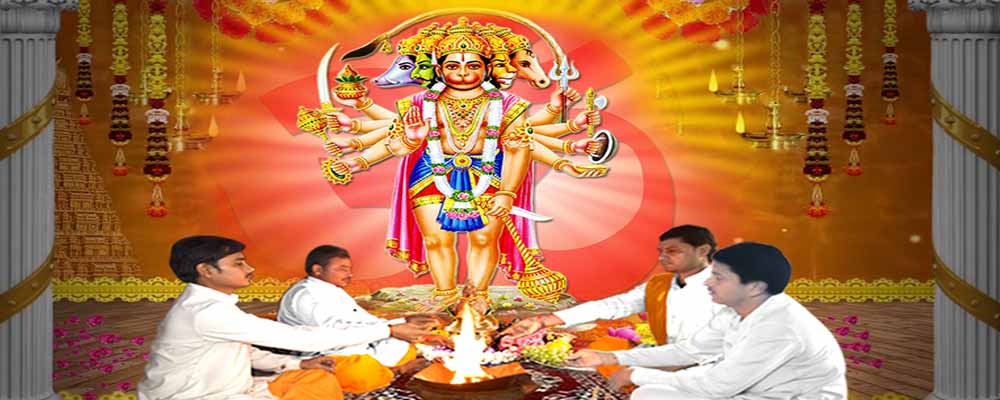
Hanuman Jayanti is an important festival for Hindus, and the celebrations of this festival include a number of rituals and traditions that are observed by devotees. Here are some of the most common rituals and traditions associated with Hanuman Jayanti:
- Fasting: Many devotees observe a fast on the day of Hanuman Jayanti as a form of penance and to seek the blessings of Lord Hanuman. Some people fast for the entire day, while others may have only one meal during the day.
- Puja: Devotees perform puja (worship) of Lord Hanuman by offering flowers, fruits, sweets, and incense sticks. They also chant mantras and sing devotional songs in praise of Hanuman.
- Visiting Hanuman Temples: Devotees visit Hanuman temples on the day of Hanuman Jayanti to seek the blessings of the deity. They offer prayers, perform aarti (prayer), and seek guidance and blessings from Hanuman.
- Reading the Ramayana: The epic Ramayana, which tells the story of Lord Rama and his victory over Ravana with the help of Hanuman, is read and recited in many households and temples on the day of Hanuman Jayanti.
- Special Prayers and Hymns: Many people organize special prayers and hymns on the day of Hanuman Jayanti. They sing devotional songs and recite hymns in praise of Hanuman.
- Donations and Charity: Many people make donations and offer charity on the day of Hanuman Jayanti to seek the blessings of Lord Hanuman. This may include offering food, clothes, and money to the poor and needy.
- Processions: In some places, people organize processions carrying the idol of Hanuman on a chariot, singing devotional songs, and chanting hymns.
Hanuman Jayanti is a time to seek the blessings of Lord Hanuman and reflect on his teachings of strength, devotion, and selfless service. These rituals and traditions are observed with great devotion and faith by devotees of Lord Hanuman across the world.
Fasting on Hanuman Jayanti
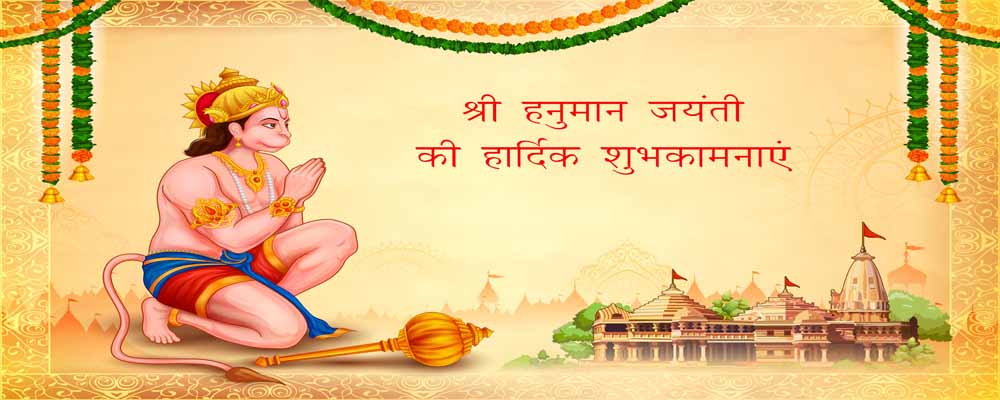
Fasting is an important aspect of Hanuman Jayanti celebrations for many devotees. It is considered a form of penance and a way to seek the blessings of Lord Hanuman. Fasting on Hanuman Jayanti involves abstaining from food and sometimes even water for the entire day.
There are different ways to observe the fast on Hanuman Jayanti. Some devotees may have only one meal during the day, while others may have fruits and milk. Some may even abstain from salt or specific foods that are considered impure.
The fast is usually broken after sunset, once the puja and aarti are performed. Devotees break their fast by consuming a simple meal, which may include fruits, vegetables, and grains.
Fasting on Hanuman Jayanti is believed to purify the mind and body and strengthen one’s devotion to Lord Hanuman. It is also seen as a way to overcome obstacles and challenges in life, just as Hanuman overcame the challenges he faced in his life.
However, it is important to note that fasting is a personal choice, and it may not be suitable for everyone. Those who have health issues or medical conditions should consult a doctor before observing the fast. It is also important to stay hydrated during the fast and not overexert oneself.
Importance of Hanuman Chalisa
Hanuman Chalisa is a devotional hymn dedicated to Lord Hanuman, composed by the famous saint Tulsidas. The word “Chalisa” means forty in Hindi, and the hymn consists of forty verses that describe the virtues and qualities of Lord Hanuman. The Hanuman Chalisa is recited by millions of devotees worldwide and is considered one of the most powerful and effective ways to seek the blessings of Lord Hanuman.
The Hanuman Chalisa is believed to have numerous benefits for devotees who recite it with devotion and faith. Here are some of the reasons why the Hanuman Chalisa is considered so important:
- Protection and Blessings: Reciting the Hanuman Chalisa is believed to offer protection from evil forces and negative energies. It is also said to bring blessings, success, and happiness to those who recite it regularly.
- Strength and Courage: Hanuman Chalisa is known for its description of Lord Hanuman’s strength, courage, and devotion to Lord Rama. By reciting the hymn, devotees seek the same qualities in themselves to overcome challenges and obstacles in life.
- Purification: The recitation of Hanuman Chalisa is believed to purify the mind and body of devotees, removing negative thoughts and emotions and promoting positivity and inner peace.
- Devotion and Faith: By reciting the Hanuman Chalisa, devotees express their devotion and faith in Lord Hanuman and seek his guidance and blessings in their lives.
- Knowledge and Wisdom: The Hanuman Chalisa is also believed to offer knowledge and wisdom to devotees who recite it regularly, helping them to gain a deeper understanding of spirituality and the teachings of Lord Hanuman.
Hanuman Jayanti Celebrations across India
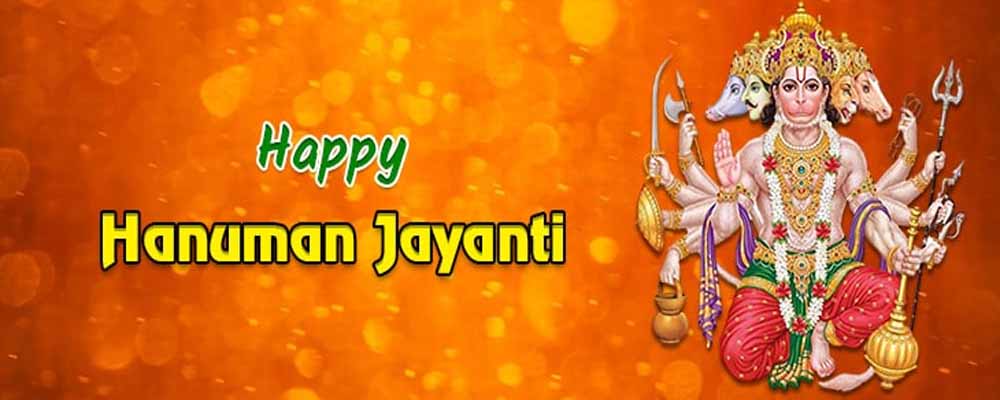
Hanuman Jayanti is celebrated with great enthusiasm across India. The festival is celebrated in different ways in different parts of the country. Here are some of the popular ways Hanuman Jayanti is celebrated across India:
- Puja and Aarti: In most parts of India, Hanuman Jayanti is celebrated by performing puja and aarti. Devotees visit Hanuman temples and offer prayers to Lord Hanuman. Special rituals are performed, and Hanuman Chalisa is recited. The aarti is performed with great devotion and enthusiasm.
- Processions: In some parts of India, processions are taken out on Hanuman Jayanti. The procession is led by a group of devotees carrying a flag with the image of Lord Hanuman. The procession passes through the streets, and devotees chant Hanuman Chalisa and sing devotional songs.
- Offerings and Prasad: Devotees offer fruits, flowers, and sweets to Lord Hanuman. These offerings are distributed as prasad to devotees.
- Cultural Programs: In some parts of India, cultural programs are organized on Hanuman Jayanti. These programs include bhajans, kirtans, and plays based on the life of Lord Hanuman.
- Feasting: Hanuman Jayanti is also a time for feasting with family and friends. Special dishes are prepared, and devotees enjoy a festive meal together.
- Charity: Many devotees also engage in acts of charity on Hanuman Jayanti. They offer donations to the poor and the needy and perform acts of service to the community.
Hanuman Jayanti is a time for joy and celebration for devotees of Lord Hanuman across India. The festival is an opportunity to express their devotion and seek the blessings of Lord Hanuman.
Hanuman Jayanti and its Significance Today
Hanuman Jayanti holds immense significance in today’s world as it reminds us of the virtues that Lord Hanuman represents. Lord Hanuman is revered as a symbol of strength, courage, and devotion. His unwavering faith and loyalty towards Lord Rama are an inspiration to millions of people across the world.
In today’s fast-paced and stressful world, Hanuman Jayanti reminds us of the importance of spirituality and inner strength. It teaches us that no matter how difficult the situation may be, we should never lose hope and always have faith in ourselves and a higher power. Lord Hanuman’s devotion towards Lord Rama teaches us that we should always remain true to our values and principles, no matter what.
Hanuman Jayanti also reminds us of the importance of service and charity. Lord Hanuman is known for his selfless service and dedication towards Lord Rama. This teaches us that we should always be willing to help others and contribute to the community in whatever way we can.
The celebration of Hanuman Jayanti also brings people of different communities and religions together. The festival is celebrated by people of all religions and is an opportunity for everyone to come together and celebrate the spirit of unity and brotherhood.
In today’s world, where there is a lot of stress, anxiety, and negativity, Hanuman Jayanti reminds us of the power of positivity and faith. It teaches us that with faith and perseverance, we can overcome any obstacle and achieve our goals.
Hanuman Jayanti is not just a religious festival, but it is a reminder of the timeless values and virtues that Lord Hanuman represents. It is a reminder of the power of faith, devotion, and selfless service. The celebration of Hanuman Jayanti has a profound impact on people’s lives and inspires them to lead a life full of positivity, hope, and compassion.
Happy Hanuman Jayanti 2024 Images & Photos
[ngg src=”galleries” ids=”5″ display=”basic_thumbnail” override_thumbnail_settings=”1″ thumbnail_crop=”0″ number_of_columns=”3″]Frequently Asked Question
Hanuman Jayanti date 2024
Tuesday, April 23, 2024
Where was Hanuman born?
According to Hindu mythology, Hanuman was born in Anjaneri mountain, near Nashik in Maharashtra.
Why is Hanuman Jayanti celebrated?
Hanuman Jayanti is celebrated to mark the birth of Lord Hanuman, who is a symbol of strength, devotion, and selfless service. The festival is celebrated with great enthusiasm across India and is an occasion for people to come together and celebrate the spirit of unity and brotherhood.
What is Hanuman Jayanti called?
Hanuman Jayanti is also known as Hanumat Jayanti or Hanumath Jayanti.
Why is there 2 Hanuman Jayanti?
There are two dates for Hanuman Jayanti as per the Hindu lunar calendar. The first one is celebrated on Chaitra Purnima, which falls in March or April, while the second one is celebrated on the full moon day in the month of Vaishakha, which falls in April or May. The reason behind the two dates is due to the different lunar calendars followed in different parts of India.

